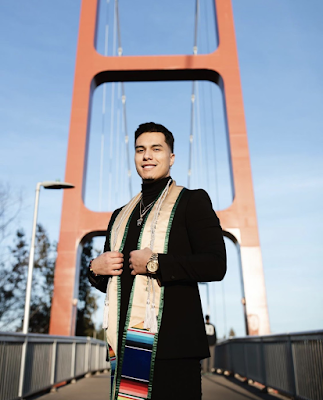The impact of online learning has many students struggling with their mental health. 2020 alumnus, Kevin Eslava, graduated with a degree in Psychology at Sacramento State and shared his experience with adapting to a virtual setting while encountering the most significant misunderstandings surrounding online learning. One of which was his parents’ view of him as unproductive in the virtual academic environment.
Before enrolling at Sacramento State, Eslava lived through his parents sacrificing their homeland to provide a better opportunity for the family. The most challenging adversity Eslava had to endure in his early life was living in Colombia, a third-world country at the time. He had to face corrupt policemen that took advantage of his father by forcing him to pay them, or else fraudulent law enforcers would take him to jail.
Eslava’s family eventually fled Colombia and reunited in the United States to seek financial stability and better opportunities. However, Eslava mentions, “It was difficult for me to ask for help with academics because I’ve always been the type to want to figure it out myself.”
After the announcement of universities shifting to a virtual platform, his parents developed a cultural disconnect with Eslava completing his courses remotely. When they returned from their shift at work, they would develop the false impression of online learning being easy.
He states, “As someone who comes from immigrant parents, and has experienced living in multiple third-world countries; mental health is not a priority amongst the wide array of adversity that’s produced by the environment. Similarly, BIPOCs in this country are faced with their own unique set of stressors and adversity that’s produced by being a minority in this country.” Typically, mental health is disregarded because it is falsely viewed as being weak, and there are other significant things to worry about. Thus, emotions are repressed and brushed aside, causing unaddressed trauma.
Eslava grew interested in expanding his knowledge on breaking the stigmas surrounding mental health in ethnic communities. He is eager to increase representation for people of color and normalize the conversation about mental health.
Eslava’s family eventually fled Colombia and reunited in the United States to seek financial stability and better opportunities. However, Eslava mentions, “It was difficult for me to ask for help with academics because I’ve always been the type to want to figure it out myself.”
After the announcement of universities shifting to a virtual platform, his parents developed a cultural disconnect with Eslava completing his courses remotely. When they returned from their shift at work, they would develop the false impression of online learning being easy.
He states, “As someone who comes from immigrant parents, and has experienced living in multiple third-world countries; mental health is not a priority amongst the wide array of adversity that’s produced by the environment. Similarly, BIPOCs in this country are faced with their own unique set of stressors and adversity that’s produced by being a minority in this country.” Typically, mental health is disregarded because it is falsely viewed as being weak, and there are other significant things to worry about. Thus, emotions are repressed and brushed aside, causing unaddressed trauma.
Eslava grew interested in expanding his knowledge on breaking the stigmas surrounding mental health in ethnic communities. He is eager to increase representation for people of color and normalize the conversation about mental health.
By Ayra Nunez '21
